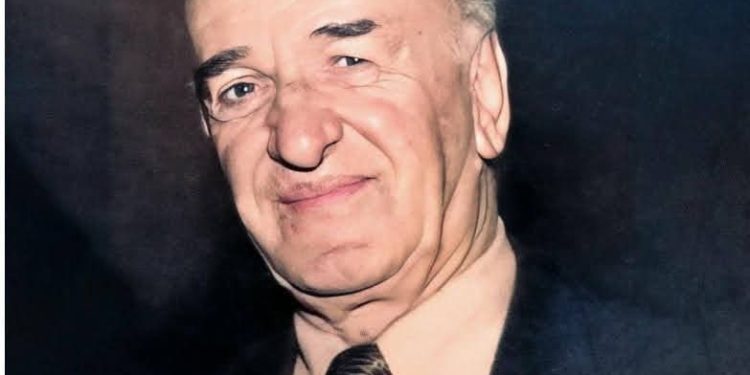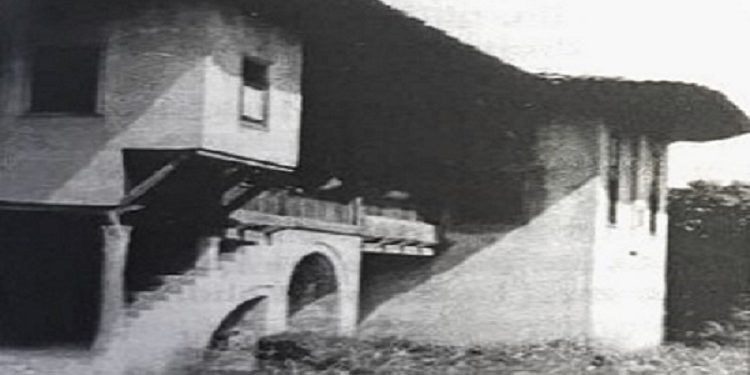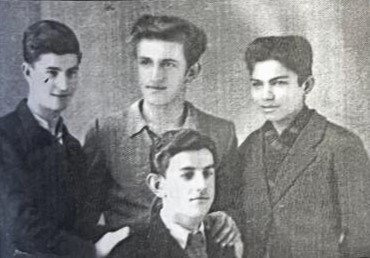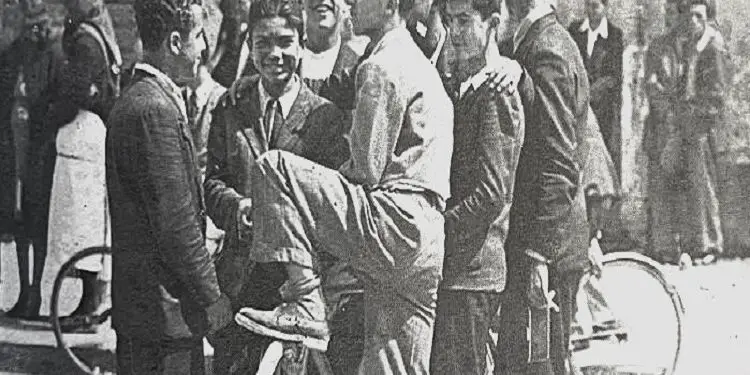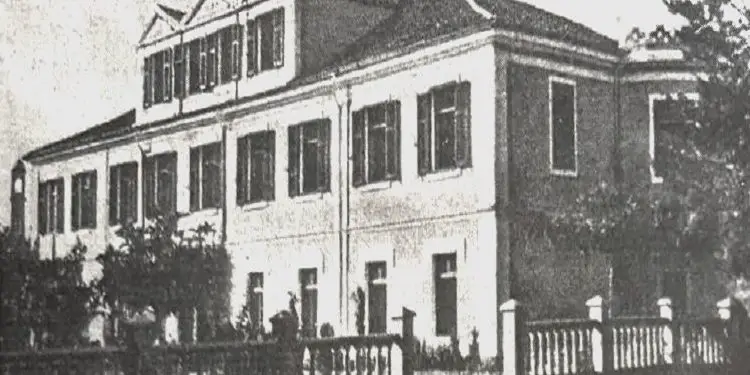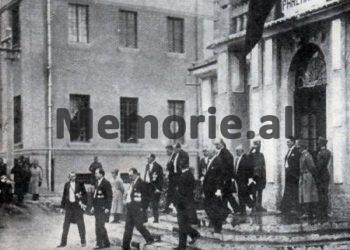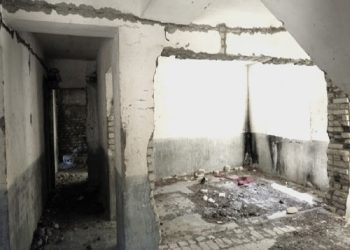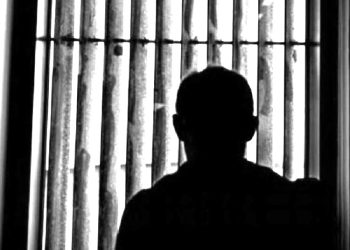By Ahmet Bushati
Part thirty
Memorie.al/After the flag was altered in 1944 with the addition of the communist star, Shkodra transformed into a center of resistance against the regime, paying a high price for its tradition of freedom. By April 1945, high school students, already feeling betrayed by the promises of the war, gathered to oppose the new terror that imprisoned and killed innocent people. Communism turned Kosovo into a province of Yugoslavia, while Shkodra was punished for its “historical crime”- its defiance against invaders. The “Postriba Movement” became a tool to suppress all dissent, plunging the city into an unprecedented spiral of suffering: imprisonments, executions, and the destruction of families. The high school students, alongside citizens, became symbols of resistance, while some “young communists” turned into tools of the State Security, leading to expulsions, imprisonments, and internments.
Four times, Shkodra rose in armed rebellion, but history forgot these battles. This book is written to remember the countless prisoners, the tortured, the killed, and the parents who suffered in silence. It is a warning against dictatorship and a plea for future generations not to forget the sacrifices made for freedom.
Continued from the previous issue
In the Footsteps of a Diary
Shkodra in the first years under communism
They took me back to cell number 9. They took me back to cell number 9 and the idea that from that gap – like a narrow line of light in the door – I would once again see everything that happened in the prison corridor made me very happy. Especially the two times when the prisoners went out to the W.C. I waited with as much interest as a young man the time of release in the square of Shkodra. As soon as I heard someone enter the corridor, whether it was the prison policeman, or if I heard the creaking of a cell door, I would immediately jump to the door, to my observation point, where I would stand with one eye closed and the other focused on the person who had just appeared in the corridor.
Since as a rule the prisoners went out to the W.C. required them to be more or less fast, and also because that movement was controlled by a criminal, such as Ismail Lulo, – the head of that prison – it must be said that there could be no normal walking. In this regard, the prisoners were divided into two categories, one that would walk at such a restrained speed, as to avoid the eventual intervention of the capricious Corporal Ismail Lulo, and the other, quite few in number but more fearful than required, – and perhaps with fewer demands for personal prestige – who would run at a very fast pace.
Among the latter, there would be two prisoners, who, if they had not been afraid even when the famous “turn” was made and never, frightened to the core, in any case they would continue running. It would be impossible to hold the gas, especially with one, -because the second had not yet arrived- for whom Ismail Lulo had not yet fully opened the door of the dungeon, out of fear and haste, his legs would be taken from the very beginning, and sometimes he would even leave a shoe on the way, not daring to waste two or three seconds to stop to put it back on.
Or, always out of excessive fear, trying to take the turn of the corridor in a hurry, even when his suitcase was full, which he would hold with one or two hands as the case may be, sometimes he would even be in danger of breaking his neck. With this man Ismail Lulo, he would play several times like a cat with a mouse: as soon as the prisoner started to run out the door, Ismail Lulo would go after him, knocking him to the ground with short, quick steps, which would make the prisoner, as if by force, run even faster, while Ismail Lulo himself would stop laughing, just like the old man laughed when, for fun, he managed to scare a child. Everything that happened in that prison would not escape my eyes.
I noticed that when the prisoners were going to the investigator, they would pass by with quite impressed faces, because the solution to the dilemma between torture and honor would always be a difficult thing for everyone. There would be prisoners who, when they set out on their journey – whether because they were really brave, or because they believed that someone might be watching them, as I was watching them – would pass by carelessly and with their heads held high, even though after two or three hours they might return with their legs taken and their heads hanging from the ropes that had been tied to them.
As for the policemen, in my experience, they were generally not bad, because above all else, they were earning a salary at that time. There were those among them who, without speaking, would express pain if they were to watch the torture, and there were those among them again, without risking themselves, who would do you even the slightest favor. All my life, I have remembered with gratitude the faces and names of the police officers who, in those circumstances of fear and danger, showed pity and pain whenever they saw us being tortured.
The policemen named Hajredin, Qani and Mërkur, all three from the south, would be among those regular and serious policemen who would start and finish their daily duty as guards, without having to make any contact with the prisoners, and of course, without wanting to add to their suffering. It is known that fear would do most of Enver Hoxha’s work.
Thus, Mënyri, the tall sergeant from Dibret, throughout his stay in the Security, would be kind to us, although he had been promoted and trusted by his superiors. A policeman named Latif and another named Hekuran, the first from Koplik and the other from the south, were quite kind to us and our families, as was Qemali, who, as far as I know, came from a village not far from Kavaja. The best words would be deserved by Beqiri, the policeman from Devoll, who did not wear the blue police uniform – like the others – but the green one of the partisans.
He came very thin from the body and with a red face, which became even redder when talking to the other. Or maybe he did not have thin lips, so thin, as if they were two strips of blue flesh. He had a habit that shortly after taking up his service as a guard there, in defiance of his superiors and in contradiction to his duty to guard us, he would open the doors of all the dungeons in turn, and when he reached the penultimate one, where I was, he would stop them to talk to me, which was strictly forbidden for any policeman. That Beqiri felt very sorry for me and his eyes often filled with tears. He wouldn’t stay long, but I would meet him there again, about a year and a half later.
At some point, a captain named Myslym, somewhat middle-aged and quite short, would also come to serve us there. He must have been from Kavaja or Shijak. At least for me, he would feel quite bad when he saw me being tortured. Another policeman named Qani, with thick blond and black hair, who when he briefly replaced Ismail Lulo, would be promoted to corporal and, from being good until then, would become bad.
Nurçja, one of the two policemen behind the chief’s gate and at his disposal, would be the policeman whose bad behavior with me, I would not forgive even a year later, on the occasion of the “return”; that he had repented, because his words would have killed me more than the interrogators’ arrows. That Nurçja annoyed me a lot. It would not have been possible for me to approach the interrogator without him coming out in front of me, harassing me. Like a hawk on a prey, he would attack me as soon as he saw me and, snarling, would say to me dozens of times; “fascist, fascist”, or “ballist, ballist”, but of course, without ever escaping without getting my answers. I had the impression that apart from full health, physical energy, stupidity and hatred for us, that man must have had nothing else.
It is also appropriate to remember with gratitude a barber named Muhamet Goga, whom during my first period in the Security, they had brought in a couple of times to shave and cut our hair. I had never known him before, nor he me, but I would have been surprised if, in those circumstances of hell for me and fear for myself, he would take advantage of a momentary movement of the policeman who was constantly standing over him, while he continued to shave and looked me in the face, and would whisper to me: “Don’t worry, you’re fine at home”, and another time? “You’re fine at home, you’re fine”, words that of course, for those who have been imprisoned in the Sigurimi dungeons, cannot be properly appreciated, and that I would repeat to myself back in the dungeon dozens of times, as a great spiritual need that I had to believe them.
Deaf
Shurdha would be that well-known character in the prison, with which hundreds and hundreds of prisoners would be associated over the years during their stay in Sigurim. Among Shurdha’s main duties was the distribution of food that families, day after day, brought to their people in prison, which Shurdha, although illiterate, passed on to the illiterate, that is, without knowing how to look at the labels hanging on the safes, but without ever making a mistake, would bring to each person near the door of the dungeon.
When he believed that the prisoners had finished eating lunch, Shurdha would go from counter to counter, giving them water from a large, tattered zinc can, and on that occasion, with his lighter lit, he would also light cigarettes for those prisoners who were smoking, a service that Shurdha wanted to perform only once every twenty-four hours, but that he, when he found the opportunity, that is, when a good policeman was there as a guard, for the good spirit he had, would light some for some at other times as well.
Shurdha spent most of his time with the policeman on duty, just as a dog would with its master. As a deaf-mute, out of boredom, he would often leave his bench next to the policeman and, as a variation, open some of the prison doors and, through mimicry, have a short conversation with the prisoner.
He was quiet, pitiful and with developed intuition. He would often come to me too, expressing his pity for me, he would constantly raise his eyebrows and affirm something that I had told him with signs, he would shake his head, accompanying it with a long series of “a”s, which sometimes sounded like they came from a large animal…! Ismail Lulo fed the deaf man with the dishes of those prisoners who were deprived by the interrogators of the right to receive food brought by their families.
Ismail Lulo once, to make fun of him, gave him a dish of fatty pork, and when Shurdha finished eating it, Ismail asked him with signs if he was satisfied with the dish he had just eaten, and Shurdha affirmed with his mouth and hands. But when Ismail put his hands to his ears in imitation of a pig, and especially when he began to move them, Shurdha, who immediately understood what he had eaten, gulped as much as he could and, screaming with the anger of a savage for the treachery of his boss, stretched his neck down and vomited so much that nothing but his intestines came out of the morsel. Even afterwards, Shurdha would continue his protest with such anger and despair that he almost cried.
The inarticulate screams of the deaf, – like the screams of an animal – in the direction of Ismail Lulo, caused him, along with the other two policemen, to burst into laughter. The deaf, of Turkish origin, had tried to escape three times, but without success. As I had once heard from an officer who was telling a policeman, the Germans had brought him as a prisoner from a Turkish area located within the borders of Bulgaria.
Cockroaches and small mice in my dungeon!
My wanderings, and perhaps tens of thousands of cockroaches that would emerge from two or three small holes under the wall and then extend like a high black chain along the wall, to disappear somewhere through a hole in the ceiling, and to return to repeat their “ritual” without rest, would be a job they could continue all day long. The presence of cockroaches did not bother me; on the contrary, it would seem to me as if it were another part of life that had entered there as if to keep me company.
However, such a thing would not happen to me with thousands, on the contrary. Since they had put a mattress and food in my dungeon, I would be visited from time to time by two small mice, which, descending from the ceiling, would play with great speed around my mattress and very quickly, as if they had come for reconnaissance, would disappear from there just as quickly.
This game of theirs, quite annoying to me, would be repeated continuously, day and night. Sometimes those small mice would get inside my mattress, causing me to throw them up like a rubber ball. Even when, out of fear of them, I was tightly wrapped under the quilt – as if inside a closed box – to my greatest embarrassment, one or two of them would still manage to get tangled up in my legs.
After a few months, there would come a time when my fingers would not impress me at all, even when they passed over my body and face dozens and dozens of times, day and night!
The calm is broken
They would start questioning me again, and as before, I would be forced to face the same provocative questions and the same threats from the investigators. Chief Lilo himself would question me, trying to convince me that I should take advantage of this opportunity, given the authority and powers he enjoyed as the chief that he was. As always, with standard words and strong gestures, he would also warn me of the consequences that would follow in case of resistance. I don’t know why; whenever I happened to be in front of him and while he continued to speak, I was always drawn by the sight of a black veil over one of his eyes, perhaps because in him I saw with wonder the war and its degeneration into violence, deceit and crime. Chief Lilo, with the aim of intimidation, would constantly use bombastic words from the political vocabulary of the time, which sounded artificial in his mouth, both for the purpose they conveyed, and for how uneducated he was.
Meanwhile, I was not answering him. Tired and annoyed by the many words he had uttered, and even more angry by my silent stance, he finally approached me, and shaking his index finger hard in front of my face towards a wall, he would continue to speak to me in an even harsher tone: “Here, against this wall, I will line up all the people you have in your house, so that they too will find out what you have done against the Government.” Before Lilo could even finish her speech, she would slap me from behind with one of those hard slaps, enough to make my eyes sparkle. Kasem Troshani, who had stood like a zombie behind my back the entire time, would once again be the author of it.
All of this, both the good and bad words of Chief Lilo, and Kasem’s slap, were intended to prepare the ground so that when a man came in to testify for me, I wouldn’t speak up, something they had taken my word for, but I wouldn’t keep it!
In the end, Lilo screamed as loud as she could, but nothing would work. As if she were angry, she called the policeman and ordered him with great authority: “Take it, take it”! I say that Lilo Zeneli, once again, was not performing the duty of a Sigurimi chief as she should have!
A piece of comedy within my drama
Again, they took my sleeping bags and they didn’t bring me any food. They kept my hands tied and twice a day that investigator from Dibra e Madhe would interrogate me. Like a few days before, at lunchtime, they would give me a piece of dry bread, as well as that big glass of water. I would sleep in pieces, sitting on the wet cement and pressed against a corner of the wall from the cold. I would shiver a lot, especially at night. In order to be discouraged, I would not be discouraged, on the contrary, since I knew that the tortures were inevitable, I would say to myself: “It will be better for the tortures to continue and for what will happen to me sooner or later to end as soon as possible”! /Memorie.al
Continued in the next issue




